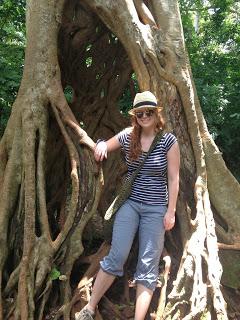This blog posting is a narrative of my field experience and thesis research I conducted in Ghana. There are two parts to my story. The first will mainly focus on my field experience, which is a requirement for the Sustainable Leisure Management Program. My field experience and my research are strongly linked, so some of my research will be discussed. Part two will focus mainly on my research and how my field experience helped prepare me for my research. My journey through Ghana was a roller coaster ride and great learning experience, so I hope you enjoy reading through it!
At the end of April, 2013 I hopped on a plane to Ghana, West Africa with Vancouver Island University’s Ghana Research and Study Tour (GRST) with my thesis supervisor and a few students in the Recreation and Tourism program. The main purpose for joining the GRST was to prepare myself for my own thesis research, which was to examine how local residents experience foreign volunteers, better know as the tourists who, “volunteer in an organized way to undertake holidays that might involve aiding or alleviating the material poverty of some groups in society” (Wearing, 2001, p.1). However, before I could start that I needed to learn more about the local culture and make connections within the host community, so that members of the host community that I interviewed would feel comfortable and respected around me, so that is where the GRST comes in.
Once in Ghana, we made our way up north through bumpy roads and extreme heat, and sometimes, torrential rain to the Wechiau Community Hippo Sanctuary (WCHS). The WCHS encompasses 17 communities. One of them is Wechiau, which is where the visitor center located and is the main hub for tourism in the sanctuary. We stayed in the visitor lodge, which is in the community of Talawona located 10km from Wechiau. We ate and slept outside, as it was too hot to be inside the lodge. On occasion, we were woken up in the middle of the night to move into the lodge because of rain, and when I say rain, I mean an intense thundering windy storm. They were actually really pretty to watch if you weren’t getting wet. We even had a yoga session in the rain one day because it felt so nice to cool off.
The GRST has conducted research in the WCHS since 2011, and this is where I was to conduct my own research. However, I had not received my ethics approval upon arrival to the sanctuary, which was a bit stressful considering the Internet, and therefore email, was sometimes non-existent. I had no idea if I was even going be able to conduct my research during the weeks I had planned to. This did give me an opportunity to focus on learning how to do cross-cultural research in the field through working on an existing GRST project. The undergraduate students on this trip were looking at the benefits and sacrifices the local communities have made since the development of the sanctuary in 1998, and I was going to participate in this research in order to prepare myself for conducting my own research, by myself, in the community. My goal was to learn more about how to be more culturally sensitive while conducting research in an unfamiliar culture.
Once we were granted permission from the Chiefs to conduct research, our all female team conducted focus groups in several communities, as well as with the sanctuary tour guides, rangers, and business people. The focus groups usually took place outside under a big tree, so it was very hot. We had to dress appropriately, which meant covering up our shoulders and knees, and this was also something to get used to in the heat. My role was to moderate the focus groups, usually with another student. This also gave me experience working with a translator, as many of the people we talked to could not speak English. We would take notes, type them up and code them, and then hand them in for further analysis. So this process gave me a fairly good idea of what I would encounter when conducting my own research.
Once the GRST was done collecting research, we shared our findings with the community at a big meeting at the visitor’s center. Everyone who participated in the study was invited to come back to see what we found. The Chiefs were also in attendance as well as members of the Sanctuary Management Board. An oral presentation was given, and then translated into the local dialect, and we also gave a written report to the management board. It felt good to share our findings with the community, and it is also very important that we did. It felt like we were giving back to the community for all their hard work in arranging and attending the focus groups. The community should know that their contributions to the study were not only important to the researchers, but important to themselves and the sanctuary.
As the title of this posting stated, this experience was a bit of a roller coaster ride. Shortly after I got my ethics approved, which was only a few days into our stay at the WCHS, I soon realized that there were no volunteers anywhere within the boundaries of the sanctuary, and there had not been since about 2005. I was definitely a bit frustrated since I was under the impression that Wechiau had many volunteers. Little did I know that was not the case. So after going through a few scenarios, I decided to add another destination, Busua, to my research in order to get data on the current state on voluntourism. This meant that I had to amend my ethics in the field and go through the whole process of waiting for approval…again.
References
Wearing, S. (2001). Volunteer tourism: Experiences that make a difference. Wallingford, Oxon: CABI.
